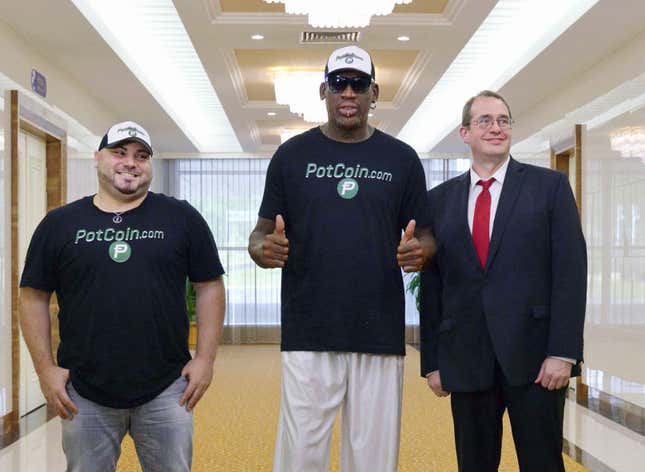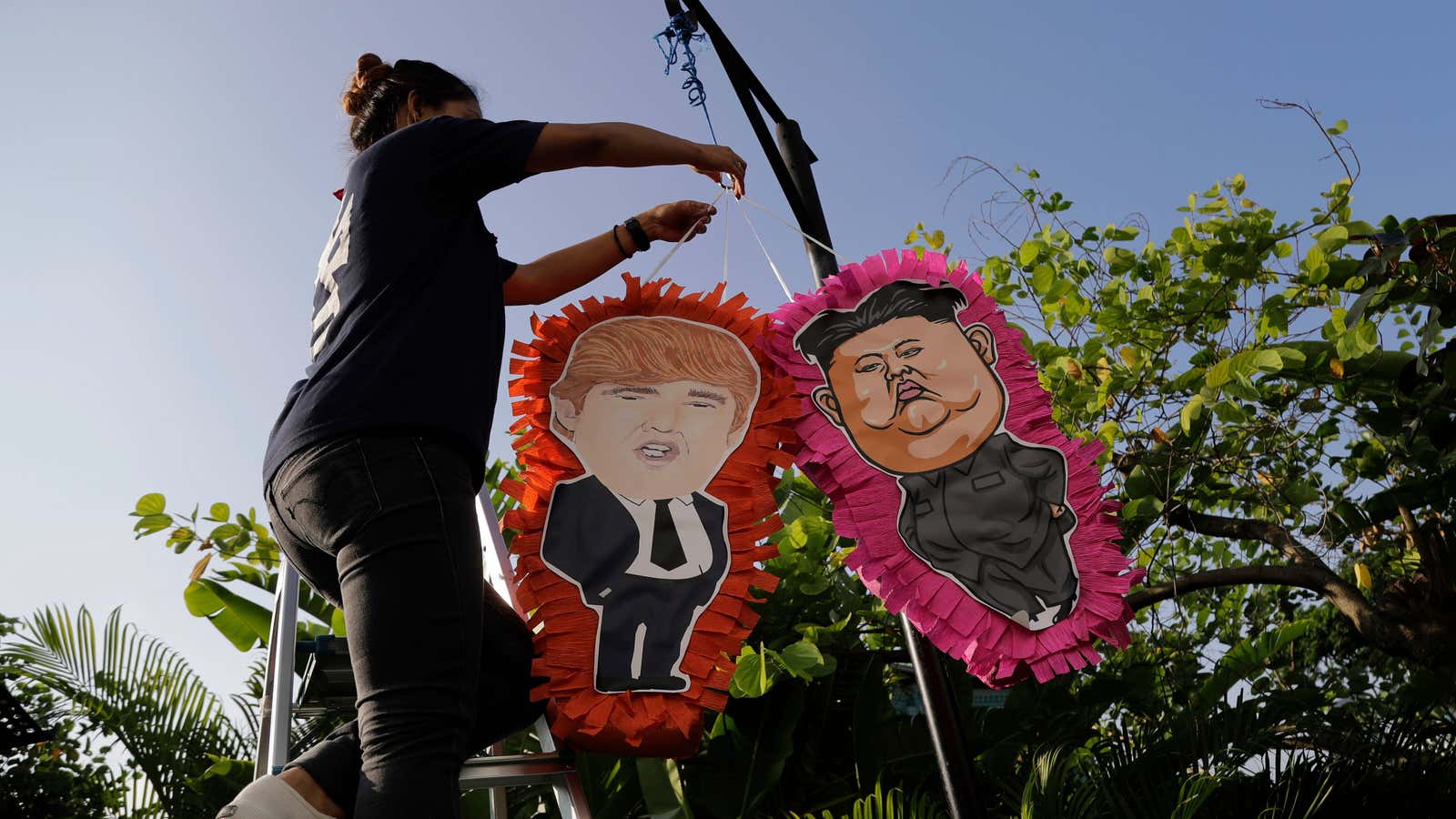Imagine hearing it five years ago: A cryptocurrency designed to facilitate marijuana purchases is backing Dennis Rodman’s trip to a peace summit between North Korea and the United States, led by Donald Trump.
Weed is legal? What is a cryptocurrency? The US and North Korea are having a peace summit? A former NBA player known for excellent rebounding skills and substance abuse is crashing it? And Donald Trump is orchestrating it?
The summit taking place in Singapore next week will look monumental. It will be the first-ever meeting between a North Korean leader and a sitting US president. But look closer, and it’s more like multiple reality shows playing simultaneously, than history in the making.
Gimmick #1: Cryptocurrency
Designed as a secure new way for people to pay for legal marijuana, cryptocurrency Potcoin is a bet on multiple speculative novelties.
Cryptocurrency has proven something of a bust in recent years. Cryptocurrencies were created as a way to exchange money transparently, free from bad central bankers, the kind that have destroyed the economy of Venezuela. That is a compelling vision, but it’s not at all what people are doing with the technology. Bitcoin, the grandfather of cryptos, is worth a lot of money not because it is widely used, but because people hope that it will someday become valuable.
A cryptocurrency for marijuana is arguably even less meaningful to the world; good old cash and credit still work fine for greasing dank palms (see Gimmick #2). Nevertheless, PotCoin forges on, apparently banking on its enthusiasm for global politics and Dennis Rodman. “The PotCoin team as a community has been incredibly supportive of Rodman’s peace mission from the beginning,” a spokesman told The Washington Post. “We’re thrilled to see how the political climate has improved between North Korean and the U.S. since he became involved.”

In Pyongyang with PotCoin.
Gimmick #2: Legal marijuana
“Fine,” you might say. “But investing in legal weed is a good idea, could be a booming industry one day.” No, the industry’s link to this summit (via cryptocurrency!) is a gimmick.
It’s true that legalizing marijuana promises to open up a market with ready-made consumers and pent-up demand. But while weed might turn out to be a profitable industry, it will be modest in size, nothing like the billion-dollar unicorns of Silicon Valley.
Colorado, where weed is legal, provides some insight. The cannabis industry there accounted for just 5.5% of employment growth in the first half of 2017, compared to 7% from boring old mining and logging, according to the Federal Reserve Bank of Kansas City. And just 0.7% of new businesses formed in the state between 2014 and 2017 were weed-related.
Gimmick #3: Dennis Rodman himself
So far we have made it about one-third of the way through the sentence that began this article. We are just now getting to Dennis Rodman in earnest.
President Trump has said that Rodman “was not invited” to the summit. Nevertheless, Rodman claims he is going.
Rodman was a kind of prototype of the modern American celebrity, dabbling in shock politics. He announced support for Donald Trump well before Kanye donned a Make America Great Again hat. He also opened his personal life to the world in a way that was rare in the pre-Instagram days, with his own reality show as early as 1996, revealing his substance abuse on the (Trump-led) reality show Celebrity Apprentice, and coping with it by appearing on yet another reality show, Celebrity Rehab with Dr. Drew.
In short, he helped create the blueprint for today’s celebrities, who have learned that publicity stunts should be not a one-off PR strategy but a way of life. Live the gimmick. The logical conclusion of that was a highly public trip to North Korea in 2014, when he stated that an US prisoner held hostage there might, in fact, deserve his fate.
Gimmick #4: Kim and Trump’s peace summit
If there were a Venn diagram of true facts stated by Donald Trump and Kim Jong Un, the overlapping middle section would contain very little. When either of them says something, the hope is not to inform, but to give off a certain impression. What they will almost certainly not do is come up with any concrete measures to reduce the risk of mutually assured intercontinental ballistic missile strikes.
To succeed, Trump would need to convince Kim to dismantle his nuclear program in a set amount of time. Yet as two of America’s top North Korea experts, testifying before a Senate subcommittee, said, that is extremely unlikely for Kim, whose attitude at home is founded on anti-Americanism and displays of strength.
Put all of these gimmicks together, and you have a recipe for a summit that has the primary goal not of developing workable solutions to dangerous problems, but of good PR for those involved. Donald Trump summed it up best. When reporters asked him what he was doing to prepare for the summit, he explained, “I don’t think I have to prepare very much. It’s about attitude.”
